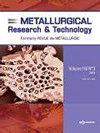用显隐混合有限元法分析超厚钢管的缺陷
IF 1.1
4区 材料科学
Q3 METALLURGY & METALLURGICAL ENGINEERING
引用次数: 0
摘要
超厚壁钢管在拉伸收缩热轧过程中极易出现质量缺陷,采用模拟方法对这些缺陷进行研究是可取的。然而,传统有限元法在求解复杂的大变形问题时往往存在收敛困难和耗时等问题。因此,本研究采用显隐混合有限元法求解减张热轧的热-力耦合过程。同时考虑了多维传热和力学边界条件,并通过工业实验验证了模型的准确性。结果表明,模拟结果与实际轧制结果非常吻合。准确预测了三种典型的轧制缺陷,即内六边形缺陷、端部加厚缺陷和线形缺陷。此外,还发现应力、应变和温度分布的不均匀是造成轧制缺陷的重要原因,并对这些影响进行了分析和讨论。本文提出了一种高效、精确的数值模拟方法,为超厚壁管材的生产提供理论指导。本文章由计算机程序翻译,如有差异,请以英文原文为准。
Defects analysis of the ultra-thick steel pipes using a mixed explicit–implicit FEM
The ultra-thick wall steel pipes are very likely to have quality defects in stretch-reduction hot rolling process, and it is preferred to study these defects by simulation methods. However, traditional FEM often has the problems of convergency difficulty and time consuming for solving complex large deformation problems. Therefore, in this study, a mixed explicit-implicit FEM, was adopted for solving the thermo-mechanical coupled process of the stretch-reduction hot rolling. Multidimensional heat transfer as well as mechanical boundary conditions were acted simultaneously, and the accuracy of the model was validated by industrial experiments. Results showed that the simulation results are very consistent with the actual rolling results. Three typical rolling defects were accurately predicted, i.e., inner hexagon, thickened ends and linear mark. Besides, it is discovered that the uneven distributions of stress, strain and temperature are important causes for the rolling defects, and these influences are also presented and discussed. This paper presents an efficient and precise numerical modelling method so as to provide theoretical guidance for the production of ultra-thick wall pipes.
求助全文
通过发布文献求助,成功后即可免费获取论文全文。
去求助
来源期刊

Metallurgical Research & Technology
METALLURGY & METALLURGICAL ENGINEERING-
CiteScore
1.70
自引率
9.10%
发文量
65
审稿时长
4.4 months
期刊介绍:
Metallurgical Research and Technology (MRT) is a peer-reviewed bi-monthly journal publishing original high-quality research papers in areas ranging from process metallurgy to metal product properties and applications of ferrous and non-ferrous metals and alloys, including light-metals. It covers also the materials involved in the metal processing as ores, refractories and slags.
The journal is listed in the citation index Web of Science and has an Impact Factor.
It is highly concerned by the technological innovation as a support of the metallurgical industry at a time when it has to tackle severe challenges like energy, raw materials, sustainability, environment... Strengthening and enhancing the dialogue between science and industry is at the heart of the scope of MRT. This is why it welcomes manuscripts focusing on industrial practice, as well as basic metallurgical knowledge or review articles.
 求助内容:
求助内容: 应助结果提醒方式:
应助结果提醒方式:


